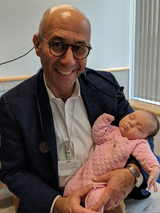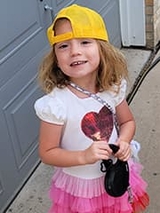Pulmonary Arterial Venous Fistula: Amelia's Story
Pulmonary Arterial Venous Fistula: Amelia's Story
If Amelia was born at any other hospital, she may not be alive today. Instead, the 4-year-old is thriving — thanks to an innovative cardiac procedure performed minutes after birth at Children's Hospital of Philadelphia (CHOP).

Today, Amelia is an easy-going kid. Yet, behind her quick smile and sparking eyes is a fighting spirit; one she needed even before she was born.
While still in utero, Amelia was diagnosed with an extremely rare and life-threatening heart defect — one so uncommon most cardiac specialists go their entire career without encountering it.
Amelia had one important factor in her favor: At CHOP, two pediatric cardiologists had treated a patient with a similar heart defect a decade earlier. They gave Amelia's parents hope they might be able to save Amelia, too.
‘I’ve never seen this before …’
Robyn was 20 weeks pregnant with Amelia when she and her husband, Nick, learned from their obstetrician that their unborn baby's heart was enlarged. The doctor, who worked at the Hospital of the University of Pennsylvania (HUP), helped the couple get an appointment the following day at CHOP's Fetal Heart Program.
“We left the appointment feeling extremely nervous, scared and uncertain of the severity of the condition,” says Robyn.
The next day, the couple met Cardiologist David J. Goldberg, MD, who reviewed the prenatal imaging scans and told Robyn and Nick that their baby had a pulmonary arterial venous fistula, an extremely rare heart defect.
Because the baby had a fistula — an extra blood vessel between the artery and vein in her lungs — blood was bypassing the lungs and flooding the heart, making it work overtime. Before birth, blood volume overload and heart failure was the worry. After birth, the lungs typically open to provide oxygen. However, in Amelia's case, the concern was that blue blood would take the path of least resistance and go through the fistula, bypassing the lungs and depriving her body and brain of oxygen. This would occur immediately — as soon as she was separated from her mother's support — placing Amelia at life-threatening risk within moments of birth.
During fetal life, the primary focus was on Amelia’s cardiac output — how much blood her heart was pumping out. Normal output for a fetus is around 400 units; Amelia was reaching the 800s and, because of this, she was at risk of heart failure before she was even born.
“Dr. Goldberg told us he had never seen a case like this before, and at CHOP there had only been one case in 30 years,” recalls Robyn. “We were devastated.”
Cardiologists in Bryn Mawr
At CHOP Specialty Care, Bryn Mawr, board-certified pediatric specialists and pediatric nurses provide outpatient care for children of all ages.
New to the Philadelphia area, Robyn and Nick weren't familiar with CHOP’s reputation as a national leader in pediatric cardiology. “We researched everything we could and discovered CHOP's Cardiac Center was one of the best in the country,” she says. “We knew we were in good hands, but it also made us a bit more nervous to know that even one of the top programs in the country had only one other case with this condition."
At CHOP, the couple had the benefit of working with a team who had diagnosed and managed the previous patient with the same condition: Jack Rychik, MD, Director of the Fetal Heart Program, and Zhiyun Tian, MD, RDCS, Chief of Fetal Cardiovascular Imaging.
Robyn and Nick met with Dr. Rychik and Elizabeth Coulter, MS, BSN, RN, Clinical Nurse Coordinator for the Fetal Heart Program. They explained the complex anatomy of the unborn baby's heart — and the very real risk their baby may not survive.
“It was alarming to hear how serious her condition was, but we wanted to continue the pregnancy. All we could do was have faith and hope the doctors' proposed treatment would work," Robyn says.
Dr. Rychik reassured the couple, saying:
We’ll find a way forward … we have a plan.
Life in limbo
With the knowledge that Robyn was carrying a baby with a known birth defect, CHOP doctors referred her to Nahla Khalek, MD, an attending obstetrician who specializes in high-risk pregnancies at CHOP's Garbose Family Special Delivery Unit (SDU). The SDU is the first birth facility in a pediatric hospital for healthy mothers carrying babies with known birth defects.
Robyn and Nick immediately connected with Dr. Khalek. “We left that appointment knowing we were going to receive the best possible care. She never took her eyes off me. She was so concerned, empathetic, and obviously competent," Robyn says. "We walked out comforted that we would be in good hands no matter what.”
The clinical team's goal was to ensure Amelia wasn't born until she was at least 32 weeks' gestation. That would give the baby time to grow and her lungs time to develop.
“At the 28-week appointment, the doctor congratulated us and said 'You're going to have a baby” since we hit the minimum milestone for intervention with this condition [for survivability], recalls Robyn. “It was a relief, but we still knew we might not come home with a baby. It made it hard to prepare."
Robyn asked her family to cancel the baby shower. And while she and Nick bought baby furniture, they kept it in boxes during the pregnancy. “We knew we couldn’t bear to take it down and return things if she didn’t come home.”
After each weekly assessment, the clinical team reassured Robyn and Nick their baby was stable, but warned she may need to be born early. As Robyn approached her 37th week of pregnancy, the team prepared for a C-section delivery on Oct. 31.
Special IMPACT delivery

Robyn's pregnancy lasted longer than anyone had expected given Amelia's heart condition, but when it came to the delivery and surgery afterwards, time was of the essence.
The plan was an "IMPACT" delivery — IMmediate Postpartum Access to Cardiac Therapy. This is a special type of Caesarean section, a highly coordinated delivery orchestrated to take place in the cardiac suite, with the baby taken immediately to an adjacent interventional room for urgent evaluation and treatment.
The IMPACT delivery is a strategy developed by the CHOP Fetal Heart Program, in collaboration with the Special Delivery Unit, specifically designed to manage exactly the type of condition Amelia had — one that required urgent, rapid cardiovascular care as soon as she was born. The plan was to quickly assess Amelia, identify the fistula, and plug it with a device using a catheter technique within the first few minutes of life.
Robyn recalls the birth process went surprisingly fast — including having a priest in the delivery room to perform an immediate baptism.
“Within minutes of getting me ready [in the delivery room] they pulled her out,” recalls Robyn. “The priest baptized her, my husband held her for a minute, they touched her cheek to mine for a moment, and then took her back for her procedure.”
Waiting for Amelia in the Cardiac Operative and Imaging Complex Hybrid Suite was Jonathan J. Rome, MD, an attending cardiologist and Director of the Cardiac Catheterization Laboratory. Dr. Rome performed a quick angiogram on Amelia and then, using a catheter, he inserted a special expanding metal plug to close the fistula. If all went well, Amelia's circulation would return to normal.
Less than two hours after Amelia was born and shortly after Robyn was moved back into her room, Dr. Rychik returned to Robyn's recovery room to share the good news: It worked.
He told us they placed the device without a problem, the fistula was closed, and that the blood was being properly pumped into her lungs.
Shortly after, Robyn got to hold her daughter for the first time.
In the days after her birth, Amelia needed a feeding tube because her overworked heart tired easily, but even with that slight hiccup, Amelia went home just 15 days later.
A healthy start and a promising future

Today, Amelia’s health is excellent. Now 4, Amelia is a normal kid with no expected restrictions on her physical activities. She doesn’t even have a scar to show what she’s been through. She is an avid reader, loves unicorns and princesses, painting, ballet class and soccer. Amelia is also learning Spanish, and she is picking it up quickly.
Robyn notes the biggest long-term effect of Amelia’s heart condition may be that she’s already medically disqualified from attending her parents' alma mater, the Air Force Academy.
Robyn says she feels fortunate the couple’s path brought them to Philadelphia.
“We feel very lucky that a doctor caught [the fistula],” says Robyn. “If he hadn’t, we wouldn’t have come to CHOP and Amelia likely wouldn’t be here.”
Robyn and Nick say they can't thank the team at CHOP enough for saving their daughter's life — and giving her a future filled with endless possibilities.
"I know we're among the lucky ones," Robyn says.
We appreciate what CHOP did for us, and hopefully we can give others hope too.